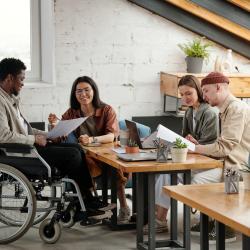Access & Accessibility


The Access and Accessibility team exists to improve accessibility for all Washington residents. We are dedicated to supporting and cultivating environments, practices, and policies that enable inclusive and barrier-free access regardless of ability, background, language, or identity. Our intent is to ensure that every state agency is equipped with the best practices and knowledge required to meet this responsibility. We believe that meaningful access goes beyond compliance; it centers the individual experience, fosters belonging, ensures co-creation, and is proactive to the evolving needs of residents.
To achieve this, we embrace the principles of “Nothing About Us Without Us”. We work alongside individuals with lived experience to identify barriers and develop best practices, ensuring that our initiatives are true to their voice.
We acknowledge meaningful accessibility is rarely a one size fits all approach. There are often intersecting considerations of language, ability, and material access. For this reason, our team has three primary focus areas that work closely together.
Digital Equity:
We ensure equitable access to digital resources, skills, and opportunities for all individuals, enabling them to fully participate in and benefit from the digital society. By addressing barriers to digital inclusion and fostering collaboration among agencies, communities, and stakeholders, we aim to create a more connected, informed, and empowered society.
Language Access:
We affirm the right every person has to speak, understand, and be understood in the language in which they feel most articulate. Therefore, we seek to create multilingual spaces in a consistent and inclusive way in order to facilitate access to crucial services and participation in programs. We believe that linguistic inclusion is part of the process of recognizing the value of diverse languages and cultures and promoting co-creation of best practices for service delivery.
Disability Access:
We respect the inherent dignity, value, and uniqueness of all people, embracing disability as a valued aspect of diversity. Promoting equitable access to services and opportunities by developing, strengthening, and supporting practices and policies that eliminate systemic barriers, we seek to create inclusive environments where everyone can thrive. By building and nurturing strong partnerships with the disability community, we ensure that our efforts are informed by those directly affected and our priorities are aligned with their needs.
